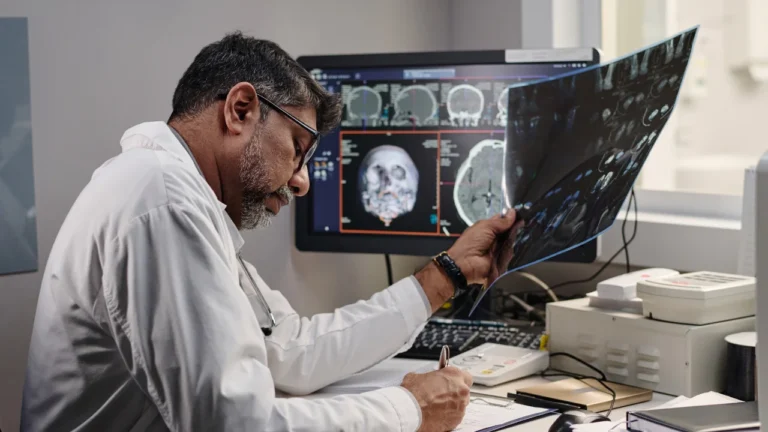Key Takeaways
- From optimizing operating room efficiency to automating post-op documentation, AI is reshaping the way surgical practices function.
- Hesitation in implementing AI in high-risk environments such as surgery remains, but these concerns are manageable with the right approach.
- By adopting the right AI solutions, you can reduce administrative stress, minimize risks, and deliver safer, smarter care.
- Find out what you need to switch to an AI-powered surgery EHR.
The surgical field is entering a moment where artificial intelligence (AI) is no longer just a futuristic idea, it has become a day-to-day essential. From optimizing operating room efficiency to automating post-op documentation, AI is reshaping the way surgical practices function. But for many providers, the shift comes with questions and concerns: Is AI secure enough for a meticulous setting such as surgery? Will it disrupt the current workflow? Can smaller practices afford to keep up?
In this article, let’s explore the evolving role of AI in surgery, answer common questions, and discuss insights into how surgical teams can embrace innovation without compromising compliance or care.
Table of Contents
What Is the Role of AI in Surgical Procedures?
AI isn’t here to replace surgeons, it’s here to support them. In surgical settings, AI helps in three key areas:
- Preoperative Planning: AI tools analyze patient imaging and medical history to suggest optimal surgical strategies, improving outcomes and reducing surprises in the OR.
- Intraoperative Assistance: AI-powered robotic systems enhance precision, while real-time data feedback helps teams make faster, more informed decisions.
- Postoperative Monitoring: AI algorithms detect early signs of infection or complications by analyzing patient vitals and electronic records, allowing for proactive care.
AI can also enhance documentation, recommend procedure codes, and monitor compliance, all with minimal manual effort from surgical staff.
How Is AI Changing the Future of Surgery?
AI is making surgical practices:
- Faster: Automated scheduling, documentation, and communication save hours per week.
- Smarter: Predictive analytics identify bottlenecks, high-risk cases, or resource shortages before they become problems.
- More Patient-Centered: Automated patient outreach and follow-up improve communication and satisfaction.
The digital transformation in surgery allows for fewer no-shows, better documentation accuracy, and faster reimbursements.
Why Many Surgical Practices Hesitate to Adopt AI
Despite the benefits AI may bring, some practices have valid hesitations. These are the most common:
- Uncertainty about adopting new technology: Change can be intimidating especially in high-stakes environments like surgery.
- Concerns over data security and HIPAA compliance: Patient confidentiality is non-negotiable, and many fear AI may put data at risk.
- Fear of falling behind more tech-savvy competitors: Staying current feels urgent, but the investment may seem daunting.
- Difficulty aligning AI with existing workflows: Practices worry about disruption or steep learning curves.
These concerns are understandable, but they’re also manageable with the right approach.
Addressing Common Concerns About AI in Surgery
1. "I’m Uncertain About Adopting New Technology"
Adopting AI doesn’t require overhauling your entire practice. Start with a single pain point such as billing errors, compliance issues, or patient communication, and pilot a solution. Many AI tools are cloud-based and integrate directly with your existing EHR or surgical software.
2. "Is AI in Healthcare Secure and HIPAA Compliant?"
Yes, when chosen wisely. Leading AI vendors follow strict protocols:
- End-to-end encryption
- HIPAA compliance
- Role-based access controls
- Audit logs and anomaly detection
Always ask for documentation of compliance and review how AI models are trained. Transparency is key to protecting your patients and your reputation.
3. "We’re Not as Tech-Savvy as Our Competitors"
Falling behind is a real risk, but one that’s avoidable. AI tools don’t require a technical team to operate. In fact, they’re designed to simplify daily tasks for clinicians and admin staff. Investing in AI now helps future-proof your practice and attract patients who expect modern care experiences.
4. "Will AI Disrupt Our Workflow?"
When implemented correctly, AI aligns with your workflow, not against it. Tools that auto-fill operative reports or flag missing compliance data run in the background, complementing your staff’s existing responsibilities. This is why it’s important to choose platforms with customizable settings and optional overrides to maintain full clinical control.
Should Small Surgical Practices Invest in AI?
Absolutely. While large hospitals may lead in AI adoption, small and midsize practices have the most to gain. Why?
- Cost savings from fewer billing errors and faster reimbursements
- Improved accuracy in documentation and surgical planning
- Higher patient satisfaction through organized scheduling and communication
- Regulatory confidence with built-in compliance checks
AI frees up your team for higher-value interactions and reduces burnout. And, for small- and mid-sized practices that rely on limited staff and positive patient experiences to drive growth, that can make a significant impact.
How Different Surgery Teams Benefit From AI
Digital transformation in surgery not only helps surgeons, it empowers every team across a surgical practice.
1. Surgeons
- Receive real-time alerts about patient readiness, imaging results, and OR schedule changes.
- Automated documentation and coding support allows surgeons to focus more on patient care and less on paperwork.
2. Pre-Op Coordinators
- Receive real-time alerts about patient readiness, imaging results, and OR schedule changes.
- Automated documentation and coding support allows surgeons to focus more on patient care and less on paperwork.
3. Surgical Scheduling Teams
- Appointment confirmations, cancellations, and rescheduling are handled automatically through AI voice or text.
- Waitlists are managed efficiently with automated alerts to fill empty OR slots in real time.
4. Clinical Documentation Specialists & Admin Teams
- AI transcribes and categorizes voicemails, auto-logs patient communications, and integrates with EHRs.
- Automated reminders ensure post-op forms, reports, and patient satisfaction surveys are submitted on time.
5. Patient & Family Communication
- AI-driven tools send real-time updates about surgical timelines, room changes, and discharge readiness.
- Families receive clear, consistent messages regarding care instructions and follow-up plans.
How to Start Embracing AI Today
Not sure where to begin? Here’s a phased approach:
- Identify your biggest bottleneck (claims, documentation, patient follow-ups).
- Research AI vendors that specialize in surgical practice needs.
- Request a demo and see how the tool integrates with your current systems.
- Train your team and start with one pilot workflow.
- Track ROI—time saved, errors reduced, and revenue retained.
Even modest investments can lead to meaningful gains in efficiency and patient outcomes.
The future of surgery means AI will no longer be a luxury, but a necessity for surgical practices looking to stay competitive, compliant, and patient-focused. By adopting the right AI solutions, you can reduce administrative stress, minimize risks, and deliver safer, smarter care.
Start small, stay compliant, and choose AI solutions that integrate easily into your workflows.











